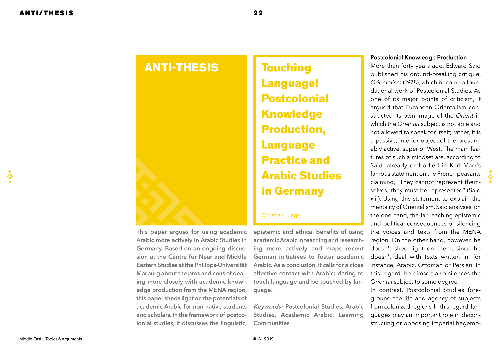Touching Language! Postcolonial Knowledge Production, Language Practice and Arabic Studies in Germany
This paper argues for using academic Arabic more actively in Arabic Studies in Germany. Based on an ongoing discussion at the Centre for Near and Middle Eastern Studies at the Philipps-Universität Marburg about the pros and cons of dealing more closely with academic knowledge production from the MEN...
Сохранить в:
| Опубликовано в:: | Middle East - Topics & Arguments |
|---|---|
| Главный автор: | |
| Формат: | Artikel (Zeitschrift) |
| Язык: | английский |
| Опубликовано: |
Philipps-Universität Marburg
2019
|
| Предметы: | |
| Online-ссылка: | Online-ссылка |
| Метки: |
Нет меток, Требуется 1-ая метка записи!
|
| Итог: | This paper argues for using academic Arabic more actively in Arabic Studies in Germany. Based on an ongoing discussion at the Centre for Near and Middle Eastern Studies at the Philipps-Universität Marburg about the pros and cons of dealing more closely with academic knowledge production from the MENA region, this paper sheds light on the potentials of academic Arabic for non-native students and scholars. In the framework of postcolonial studies, it discusses linguistic, epistemic and ethic benefits of using academic Arabic in teaching and researching more actively and maps recent German initiatives to foster academic Arabic. As a conclusion, it calls for a close affective contact with Arabic: Daring to touch language and getting touched by language! |
|---|---|
| DOI: | 10.17192/meta.2019.13.8082 |
